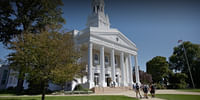The Whitin Observatory is the home of the Wellesley College Astronomy Department and houses classrooms, astronomy laboratory facilities, the Astronomy Library, and faculty offices. Built in 1900, and enlarged in 1906, 1966, and 2010, it is considered an unusually fine facility for undergraduate training in astronomy. Our telescopes are used for College teaching activities and research observing nearly every clear night.
Our students have many opportunities to engage in astronomy-related activities beyond the formal curriculum. They learn to operate our historic and modern telescopes and serve as nighttime lab assistants, research assistants, and tour guides. They observe the sky for fun as part of club A.S.T.R.O. They can carry out research under the direction of Wellesley faculty and, during the summer, with faculty at other schools within the Keck Northeast Astronomy Consortium or other NSF-funded programs.
Research Opportunities for Students
The research interests of the Astronomy Dept. faculty span a wide range of specialties, from planetary sciences to stellar and extragalactic astronomy. Department faculty and students conduct research using observations from our own 24-inch Sawyer telescope on campus, as well as larger telescopes worldwide and spacecraft throughout the solar system.
Telescopes and spacecraft used by Wellesley faculty and students:
- Gemini ( 8 m ) on Mauna Kea in Hawaii
- Magellan ( 6.5 m ) in Northern Chile
- Hubble Space Telescope
- Arecibo radio observatory
- Hubble Space Telescope
- Spitzer Space Telescope
- Cassini, now in orbit around Saturn.
- New Horizons, en route to Pluto
- FUSE: Far-ultraviolet spectroscopic explorer
- Mars Exploration Rover (Opportunity and Spirit)
- Mars Reconnaissance Orbiter (MRO)
- Lunar Reconnaissance Orbiter (LRO)
Wellesley College is also part of the Keck Northeast Astronomy Consortium (KNAC), a group of eight liberal arts colleges with astronomy research programs. The consortium supports student summer research exchanges.
Additional summer research opportunities off-campus are available through the National Science Foundation Research Experiences for Undergraduates (REU) program; their site includes a searchable listing of REU programs in astronomy and astrophysics.













.jpeg?tr=h-40,w-40,c-force)

